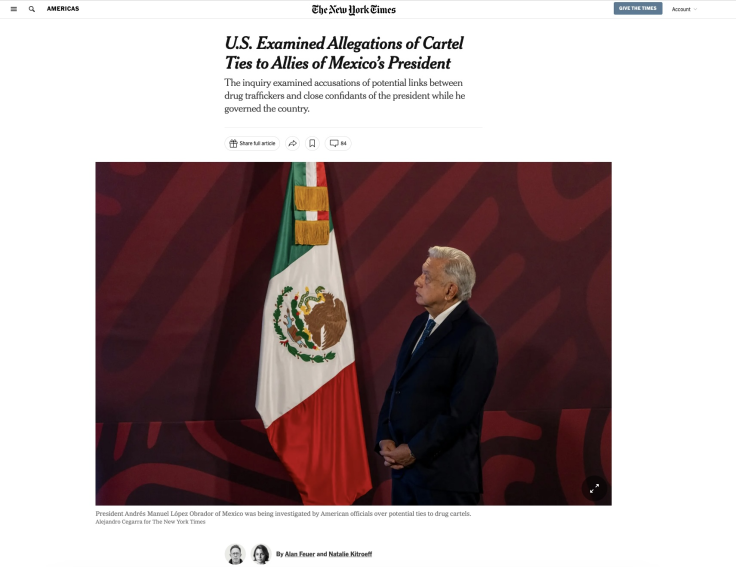
U.S. officials for years investigated allegations that individuals close to Mexican President Andrés Manuel López Obrador (commonly known as AMLO) received millions of dollars from members of drug cartels during his administration, The New York Times reported.
The article, titled 'U.S. Examined Allegations of Cartel Ties to Allies of Mexico's President,' was published on the Times website on Tuesday. However, hours before its publication, the case had already gained attention on social networks. This occurred after López Obrador said during his morning press conference that the newspaper's local bureau chief had sent him some questions on the matter.
In what pundits and commentators have referred to as a violation of correspondent Natalie Kitroeff's data privacy, AMLO not only read the questions she fielded him but also publicly disclosed her telephone number.
Que el presidente use la tribuna del poder para revelar la información personal (doxing) de una reportera que, de manera impecable y respetuosa, lo buscó para obtener su reacción a una investigación periodística debería merecer la condena inequívoca de todo aquel que se llame…
— León Krauze (@LeonKrauze) February 22, 2024
The backlash was quick: "The fact that the president used the platform of power to disclose personal information (doxing) of a reporter who, in an impeccable and respectful manner, sought him out to obtain his reaction to a journalistic investigation, deserves unequivocal condemnation from anyone who identifies as a journalist in Mexico," said journalist Leon Krauze.
El presidente no solo mostró el número de teléfono de @Nataliekitro. LO LEYÓ EN VOZ ALTA.
— Luis Fernando García (@tumbolian) February 22, 2024
El presidente haciéndole doxing a una periodista.
Qué tipo tan miserable. Se nota su enojo y desesperación.
"The president not only displayed the phone number of @Nataliekitro. HE READ IT OUT LOUD. The president doxing a reporter. What a miserable guy. You can see his anger and desperation," posted Luis Fernando García, director of R3D, a group advocating for the digital human rights of users.
AMLO also referred to the NYT as a "filthy rag," just as he criticized ProPublica, which had previously published a series of reports about the DEA having investigated aides for allegedly receiving money from the Sinaloa Cartel.
In the Times article, Kitroeff and Alan Feur state that, according to U.S. records and information from three individuals familiar with the matter, officials had received millions of dollars from drug cartels during the AMLO administration.
"The inquiry, which has not been previously reported, uncovered information pointing to potential links between powerful cartel operatives and Mexican advisers and officials close to the president while he governed the country," the journalists reported.
They also said that this previously unreported investigation reveals links between powerful cartel operatives and officials close to the president during his current administration
According to the Times, sources revealed that the U.S. never initiated a formal investigation into the case, which was ultimately shelved after concluding that the government had "little appetite" for investigating one of the country's main allies.
During his morning conference, AMLO stated that these accusations are "completely false." He emphasized that such a revelation about an investigation into his administration would have no effect on the bilateral relationship and announced his intention to seek a position on the matter from the Biden administration.
In lashing out at the Times, AMLO repeated his playbook of criticizing media outlets or journalists who, in his view, attack him for their agenda or on the orders of his political adversaries.
AMLO had previously stated that Tim Golden, the author of the ProPublica story, was an emissary of his political adversaries. He claimed that the publications from his media outlet, as well as from DW and InsightCrime, were a 'vulgar lie.' These media outlets published versions allegedly leaked by DEA insiders, asserting that aides of the president received at least $2 million to support his first presidential campaign in 2006, which he lost to Felipe Calderón.
AMLO has also confronted Mexican media reports suggesting that another drug cartel supported his campaigns.
One of them came from digital media outlet LatinUS, which reported that members of a group affiliated with the Zetas, a criminal gang that became the most bloodthirsty mafia group in the first decade of the 2000s, delivered money to individuals close to the current president.
In all cases, AMLO has denied the information, disqualifying the media and journalists and emphasizing that these are politically motivated campaigns arising from the heat of the current electoral process.
One of the challenges the Mexican president has had to confront is the trend observed several weeks ago, in which various iterations of '#NarcoPresidente' have had millions of impacts on social networks.
© 2025 Latin Times. All rights reserved. Do not reproduce without permission.




